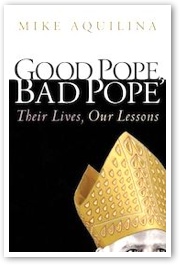Good Pope, Bad Pope: Their Lives, Our Lessons
- MIKE AQUILINA
The popes whose stories you'll read here show us how Christ kept his promise to his bride, the Church, not only in her health but also in her sickness. That's why, even in its darkest moments, the story of the papacy is a story of triumph. And that's why it's worth knowing these twelve popes.
 |
When in Rome I try to get to the Basilica of St. Paul Outside-the-Walls in Rome. There, one can see a long line of portraits in a frieze above the columns: Every pope who ever reigned has his face on the wall. A tourist can start at the current pope and walk back through the nineteenth century, the Renaissance, the Middle Ages, the Dark Ages, the height of the Roman Empire — and finally end at St. Peter, the rock on whom Christ built his Church.
It is a jaw-dropping experience. People have been converted to the Catholic faith just by the experience of walking past those portraits, one after the other, and seeing the unbroken line back to Peter.
Stop and think about that for a moment: We know the name of every pope, from Peter to Francis, from the first century to the twenty-first (You can find numbered lists of the names on the Internet.) Does any other human institution have an unbroken succession of leaders for two thousand years?
The papacy isn't an invention of the Middle Ages or some fiction created by the Emperor Constantine. This succession of popes is historical fact — and one of the most amazing facts of history at that.
So what is the pope?
The pope is the most remarkable man on earth. And that's not because of who he is but because of what he is. The man as such may be drab and uninteresting (although very few of them really are uninteresting), but as pope he's completely unique. He is the Vicar of Christ, the visible head of the Roman Catholic Church.
The pope is also the Bishop of Rome. The two responsibilities go together. That's because St. Peter was the leader Christ chose for his Church, and he was also the first leader of the church in Rome. He passed both positions on to his successor.
While Peter was alive, everyone in the Catholic Church had to be in communion with him. Since Peter's time, being in communion with the Catholic Church has meant being in communion with the church in Rome and her bishop, the pope. That makes the pope the center — the visible source of unity for all the bishops of all the places on the face of the earth.
It's not so much that the other bishops serve under the pope as that the pope is the foundation that holds the whole structure together. The bishops are free to be Catholic leaders because they can lean on that foundation. Without Rome the other local churches would spin in all directions — as we've seen with the separated churches that reject communion with Rome.
The pope's responsibility is awe-inspiring, to say the least. The man who sits in Peter's chair — and he's just a man, like everybody else — is the head of all Christ's people on earth. Fortunately, the pope doesn't have to do it all by himself. Christ promised that the gates of hell would not prevail against his Church (see Matthew 16:18), so the pope gets the necessary help and protection when he needs it. This is what we call "papal infallibility."
What do we mean when we say the pope is infallible?
Good Pope, Bad Pope: Their Lives, Our Lessons
by Mike Aquilina |
We certainly don't mean that he's always right about everything. The pope is a human being like everyone else. He may be uncommonly good. In the last few centuries, we have had more popes who were uncommonly good than otherwise. But there have been times when the pope was an uncommonly bad man. And even an uncommonly good pope can still trip over the carpet or mispronounce a word. If he falls flat on his face, he doesn't have to pick himself up, brush himself off, and say, "I meant to do that," in order to maintain the truth of papal infallibility.
Papal infallibility is something much more limited and much more comforting. Because Christ promised that the Holy Spirit would protect the Church from error — and because Christ keeps his promises — we know that when the pope, acting in his official capacity as leader of the Church, defines a doctrine that is a matter of faith or morals, he cannot teach error. But the pope can be wrong about astronomy. He can be wrong about biology. He can be wrong about all sorts of things, and — being human — he frequently is.
This distinction is important when somebody points to a notoriously corrupt pope and asks, "How can you say your pope is infallible?" No one has any trouble with the obviously good popes, the ones like St. Leo the Great, who steered the Church through perilous waters and stood up heroically for the faith against long odds. But it's really the bad popes who make the best argument for infallibility.
When we read history, it's clear that God's graces do not depend on our works. He makes his sun rise on the evil popes and on the good and sends rain on the just and on the unjust (see Matthew 5:45). Bring on the worst popes in history! If even they, with all their power, haven't been able to make a dent in Catholic truth, then it really does look as though something more than natural is going on. The Spirit really must be protecting us, because even the legendarily immoral Benedict IX and Alexander VI never managed to teach error in matters of faith and morals.
Maybe this is why Christ chose Peter, out of all the apostles, to be the first in the long line of popes. Impetuous, cowardly, bold, not always right in how he saw things, Peter was far from perfect. But with Christ's help there was nothing he couldn't do. And if Christ can make pope material out of Peter, he can do it with anyone.
Why did I choose the particular popes you'll meet in the pages of this book? Why not Gregory I, whom many would call the greatest pope of all time? Why not Leo X, who was pope at the beginning of the Protestant revolt? Why not Leo XIII, who boldly stood up for the rights of workers?
Well, believe me, I wish I could have told all their stories. Every pope is by definition a remarkable man. But I think the popes whose stories you'll read here are worth knowing because they show how the papacy developed and how Christ kept his promise to the Church not only in her health but also in her sickness. The great ones advanced our understanding of Christian doctrine, and what's even more remarkable, the worst ones could do nothing to damage the teaching of the Church. I should admit that I have a personal reason for including John Paul II on my list. He's the only pope who ever kissed my children. I think he's interesting for other reasons too, but I wanted to be honest with you.
 This is Meaghen Gonzalez, Editor of CERC. I hope you appreciated this piece. We curate these articles especially for believers like you.
This is Meaghen Gonzalez, Editor of CERC. I hope you appreciated this piece. We curate these articles especially for believers like you.
Please show your appreciation by making a $3 donation. CERC is entirely reader supported.

Acknowledgement
 Mike Aquilina. "Introduction." from Good Pope, Bad Pope: Their Lives, Our Lessons (Cincinnati: OH, Servant Books, 2013): v-viii.
Mike Aquilina. "Introduction." from Good Pope, Bad Pope: Their Lives, Our Lessons (Cincinnati: OH, Servant Books, 2013): v-viii.
Reprinted with permission of Servant Books.
The Author

 Mike Aquilina is vice president of the St. Paul Center for Biblical Theology. He is the author or co-author of fifty books including A History of the Church in 100 Objects, Seven Revolutions: How Christianity Changed the World and Can Change It Again, Yours is the Church: How Catholicism Shapes Our World, Good Pope, Bad Pope: Their Lives, Our Lessons, Love in the Little Things: Tales of Family Life, Living the Mysteries: A Guide for Unfinished Christians, Fathers of the Church: An Introduction to the First Christian Teachers, The Way of the Fathers: Praying with the Early Christians, and Praying in the Presence of Our Lord: With St. Thomas Aquinas. With Cardinal Donald Wuerl, he is the author of The Church: Unlocking the Secrets to the Places Catholics Call Home, and The Mass: The Glory, the Mystery, the Tradition. See Mike Aquilina's "The Way of the Fathers" blog here.
Mike Aquilina is vice president of the St. Paul Center for Biblical Theology. He is the author or co-author of fifty books including A History of the Church in 100 Objects, Seven Revolutions: How Christianity Changed the World and Can Change It Again, Yours is the Church: How Catholicism Shapes Our World, Good Pope, Bad Pope: Their Lives, Our Lessons, Love in the Little Things: Tales of Family Life, Living the Mysteries: A Guide for Unfinished Christians, Fathers of the Church: An Introduction to the First Christian Teachers, The Way of the Fathers: Praying with the Early Christians, and Praying in the Presence of Our Lord: With St. Thomas Aquinas. With Cardinal Donald Wuerl, he is the author of The Church: Unlocking the Secrets to the Places Catholics Call Home, and The Mass: The Glory, the Mystery, the Tradition. See Mike Aquilina's "The Way of the Fathers" blog here.





